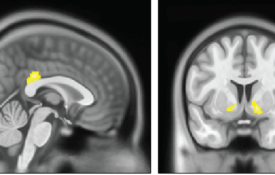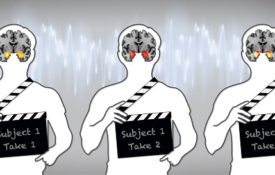-

Up-and-Coming Voices: Methods in Neuroscience
Previews of research on neuroscience by early-career psychological scientists.
-

New Research in Psychological Science
A sample of research on children’s susceptibility to trust strangers, prosocial behaviors in adolescents, temporal structure in memory, memory accuracy for real-world events, effort and pupillometric investigation, personality changes and career, and a neurobiological examination of delayed judgments of learning.
-

New Research in Psychological Science
A sample of research on cultural distance, gossip and lying, skill learning, air pollution and anxiety, and the reliability of task-functional MRI measures.
-

Scanning the Brain to Predict Behavior, a Daunting ‘Task’ for MRI
New research indicates that task-fMRI lacks the reliability to predict individual behavior or how a person might respond to mental-health therapies. [June 3, 2020]
-
Scientists are using MRI scans to reveal the physical makeup of our thoughts and feelings
Who among us hasn’t wished we could read someone else’s mind, know exactly what they’re thinking? Well that’s impossible, of course, since our thoughts are, more than anything else, our own. Private, personal, unreachable. Or
-
Crossing Disciplines and the Lifespan
Cornell University’s Department of Human Development incorporates not only various aspects of psychological science, but also law, sociology, history, and more. APS Fellow and Department Chair Qi Wang details the department’s successes.

